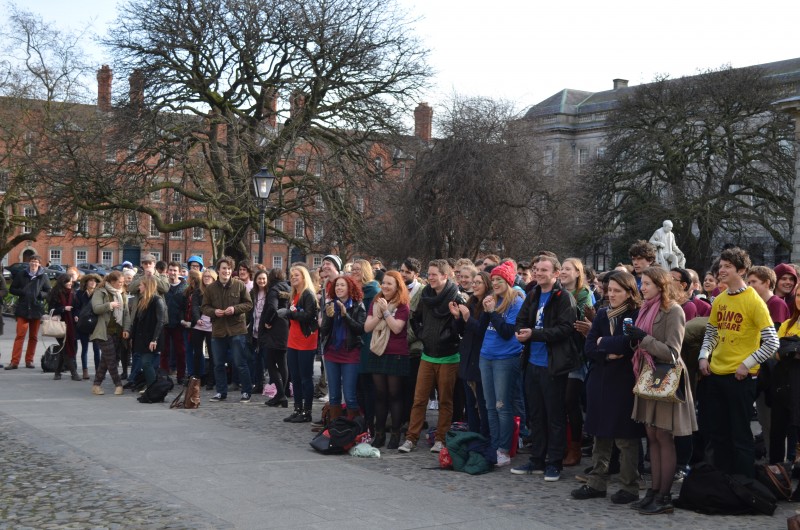Aisling Curtis | Senior Staff Writer
In the bubble that is Trinity College Dublin, the Sabbatical Elections rapidly become the be-all and end-all obsession of a student body that rarely shows half as much enthusiasm as it exhibits during the campaign weeks. Trinity’s batch of referendums are characterised by a typically low voter turnout, but the Leadership Race instead sees a massive spike in interest, with a larger electorate presence than any other TCDSU poll. This larger turnout is surprising, considering how often that swear word of “student apathy” is bandied about. What is it about these campaigns that are done right?
On the surface, the leadership race draws attention due to the benefits it provides College: such a blatant display of student interest gives us sway on both a college-wide and national level, as we show that our student body cares about the direction its SU takes. The elections are purportedly important: we need them to ensure we’re represented by the best of Trinity’s brightest, so that we can pick and mix the changes we want to see, and so the SU can do its job. We need elections so we can perceive a neat and reassuring modicum of control in who fights for or against the decisions made by those higher up.
Students veer to the bright and shiny, the tiger onesie, the big campaign events
This democracy brings us power, both in terms of arousing student interest and drawing the notice of those who make the rules. Only it may be less democratic than we’d like to think. Not to generalise – many students are very informed – but a large proportion of us are not swayed by the more complex and sober arguments. Acknowledgment of the smaller and more boring issues that need to be solved in the SU falls flat with students, who instead flock after vivid, enticing breadcrumbs – promises of explosive change and no fee increases and free chocolate on Fridays for all. The greyer campaigns, the “boring” candidates, the less aggressive campaigning teams – all are overlooked, as students veer to the bright and shiny, the tiger onesie, the big campaign events. One Trinity student told me that she intended to vote for “the hot one” in one of the races, his intentions in office aside. It’s an attitude that represents us better than our leaders sometimes do.
In the confines of College, we are distracted by the allure of ‘Trinity Celebrities’ over the promises of those we perceive as unknown. Though a mysterious process, becoming one of Trinity’s glitterati not only gives you several thousand Facebook friends but also a ready-made rabid campaign team who will fight tooth and nail for your dreams. It’s rare that an electoral race does not have one person with greater influence than others, purely because they’ve somehow procured that fragile and intangible student fame. A person’s campaign may be thick with potential but their reality may never manifest, simply because they didn’t network like others did, or weren’t as personable, or didn’t come from an influential big school or study in one of the largest courses. Thanks to a process of dumb luck, they didn’t achieve Trinity fame; and, in all likelihood, many of them won’t achieve the winning student vote.
That control is only superficial if candidates are elected based on popularity, looks, or vivid and inventive campaign events
Last year, I stood beside a polling stand and selected candidates that I’d heard others mention or who’d had the most Arts Block spotlight or who my friends were campaigning for. So I don’t stand on a pedestal when I say that this is how many students choose which box they tick. Though the elections do have benefits – giving us some control over who informs us and supports us and fights for us – that control is only superficial if candidates are elected based on popularity, looks, or vivid and inventive campaign events. While it’s inspiring to see students stepping outside the comfort zone of the usual ‘ah-sure-be-grand’ attitude of the young Irish electorate, it is equally sad to see the demise of ideas that could have been transformational, if only the candidate had joined a few more societies in First Year. Not only that, but such a bias is characteristic of Irish politics, where again and again it’s clear that your mates are the ones who’ll get you where you need to go. Endemic in society, this problem isn’t going away – either inside or outside Trinity’s walls.
Of course, you can’t curtail a race based on Facebook friends, and so a solution to this is hard to find. One can only hope that eventually an awareness of all ideas, even the ones that seem convoluted and dry, can be coaxed out of the Trinity electorate. Maybe one day that multitude of manifestos won’t end up decorating the inside of the bin. Maybe one day candidates’ friends won’t be what snag them the vote. Maybe one day it’ll be ideas – and not inventive campaigning – that really draw Trinity students in droves.






